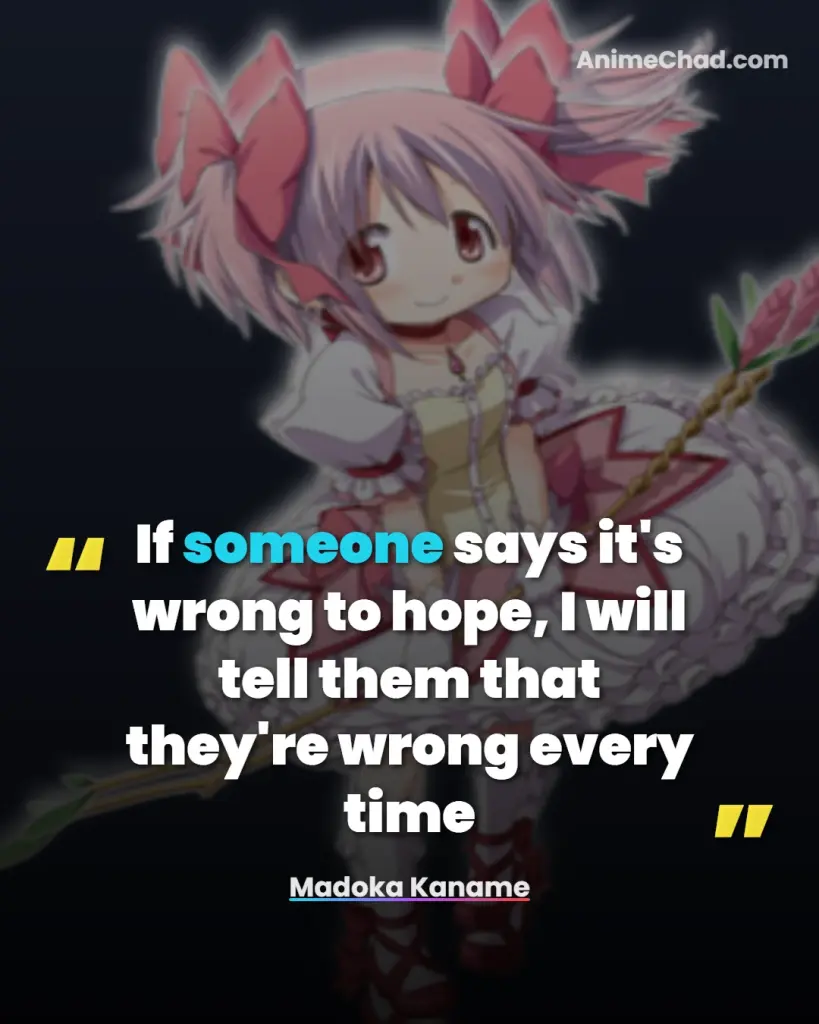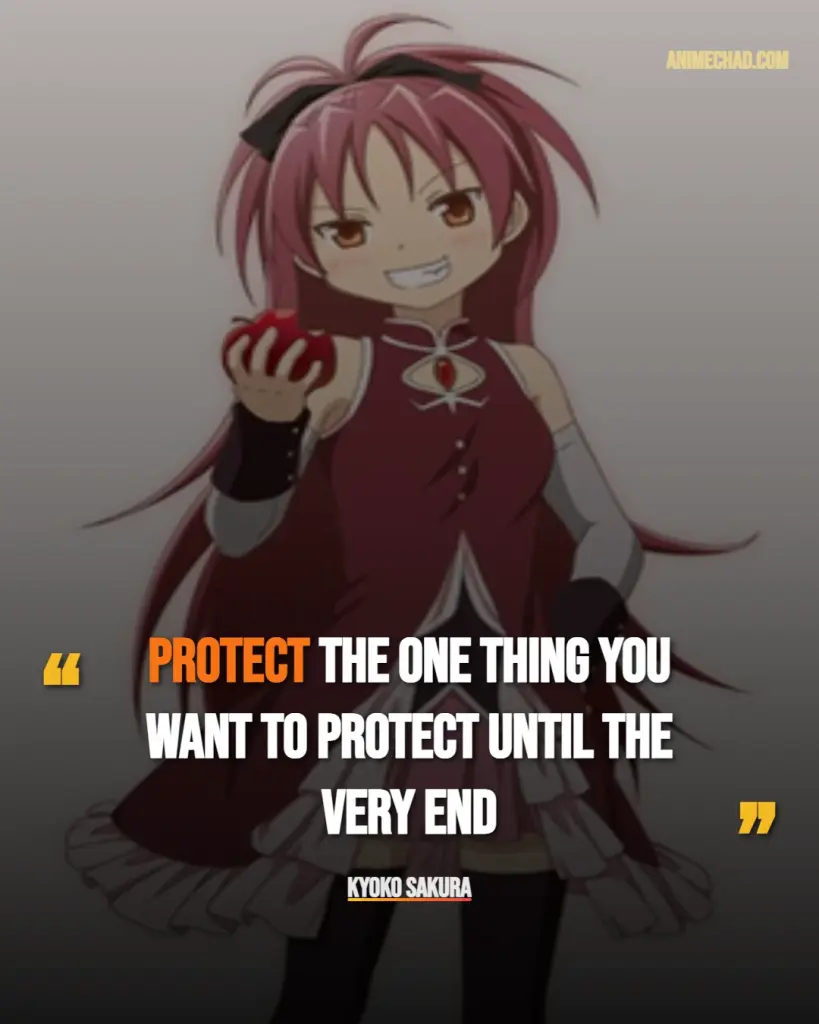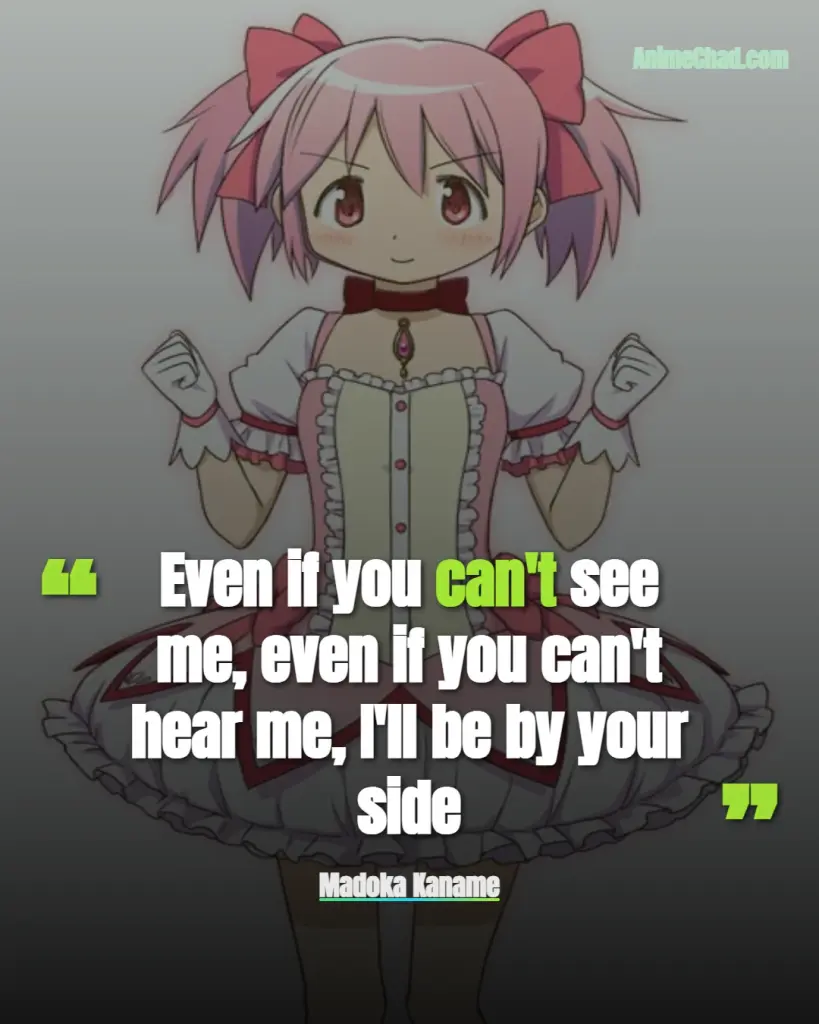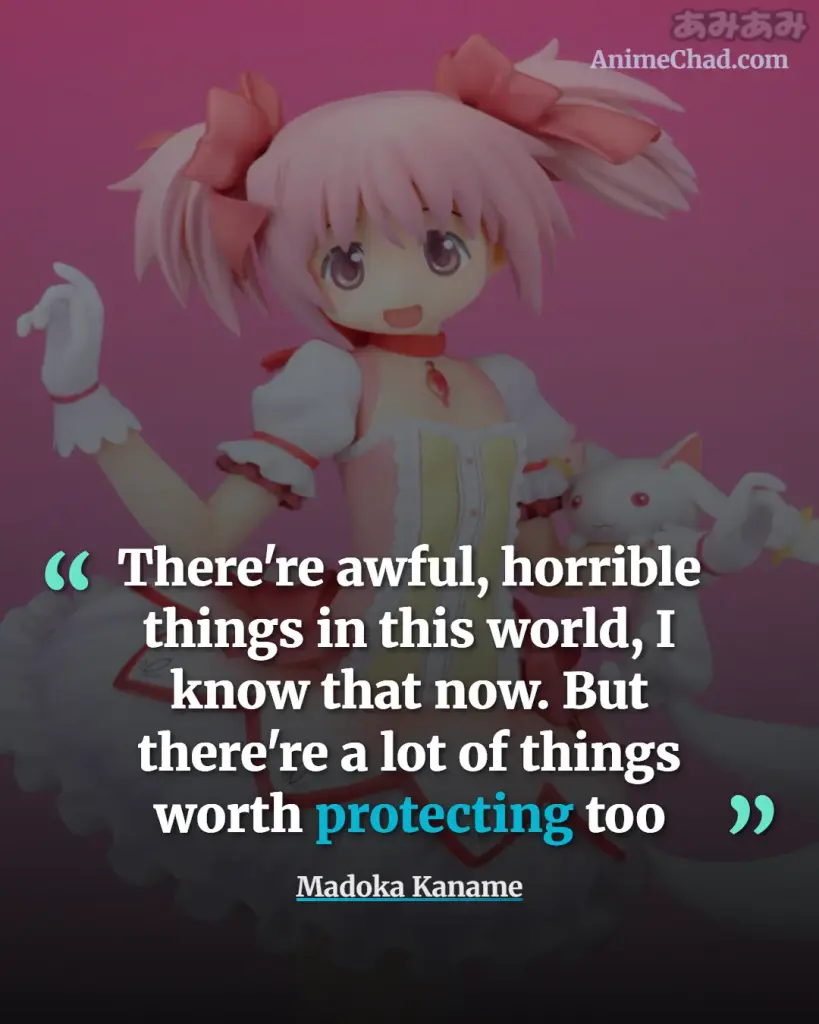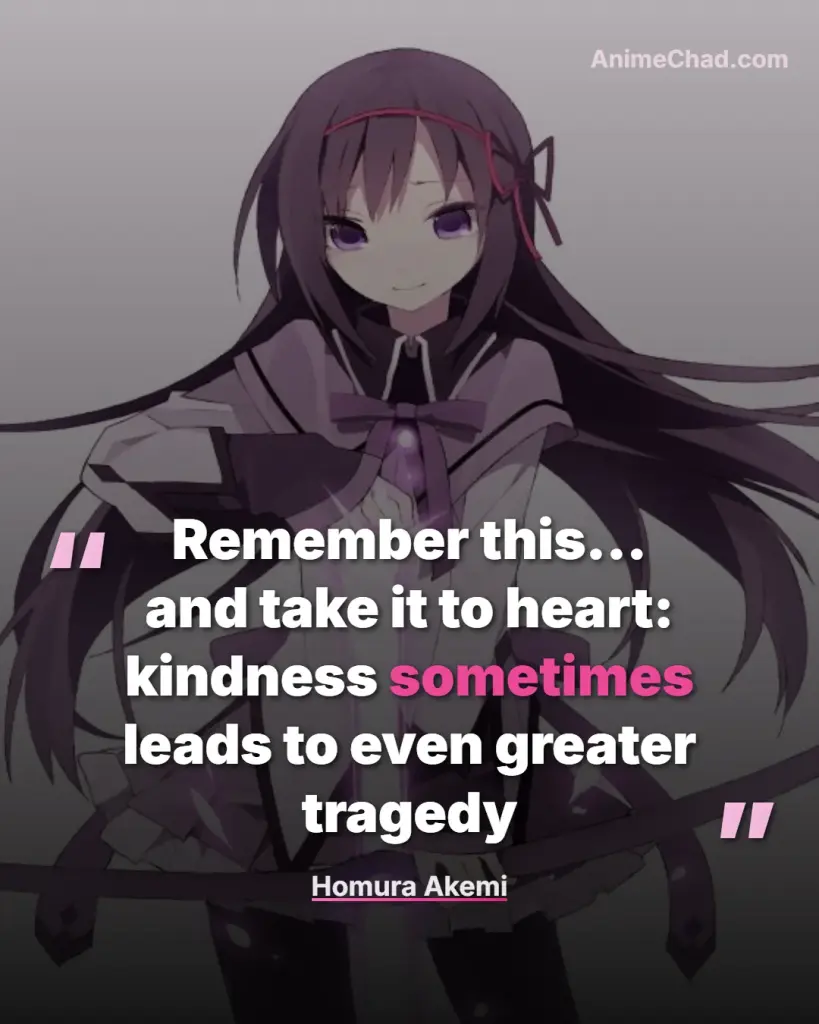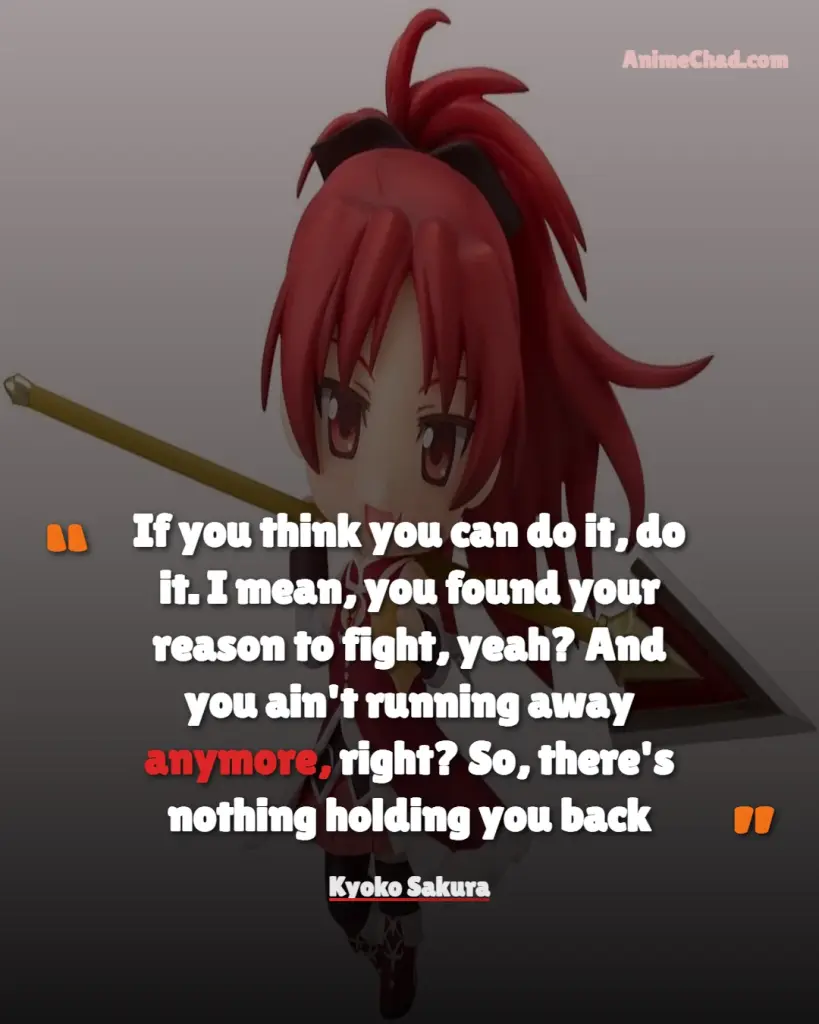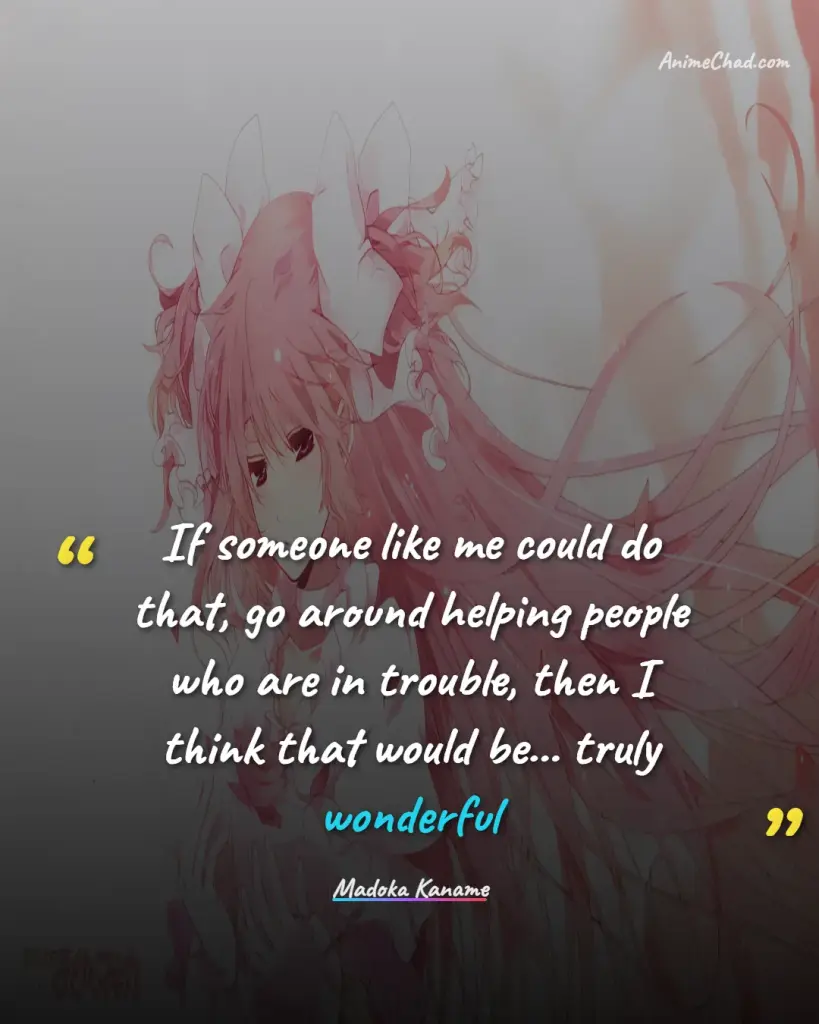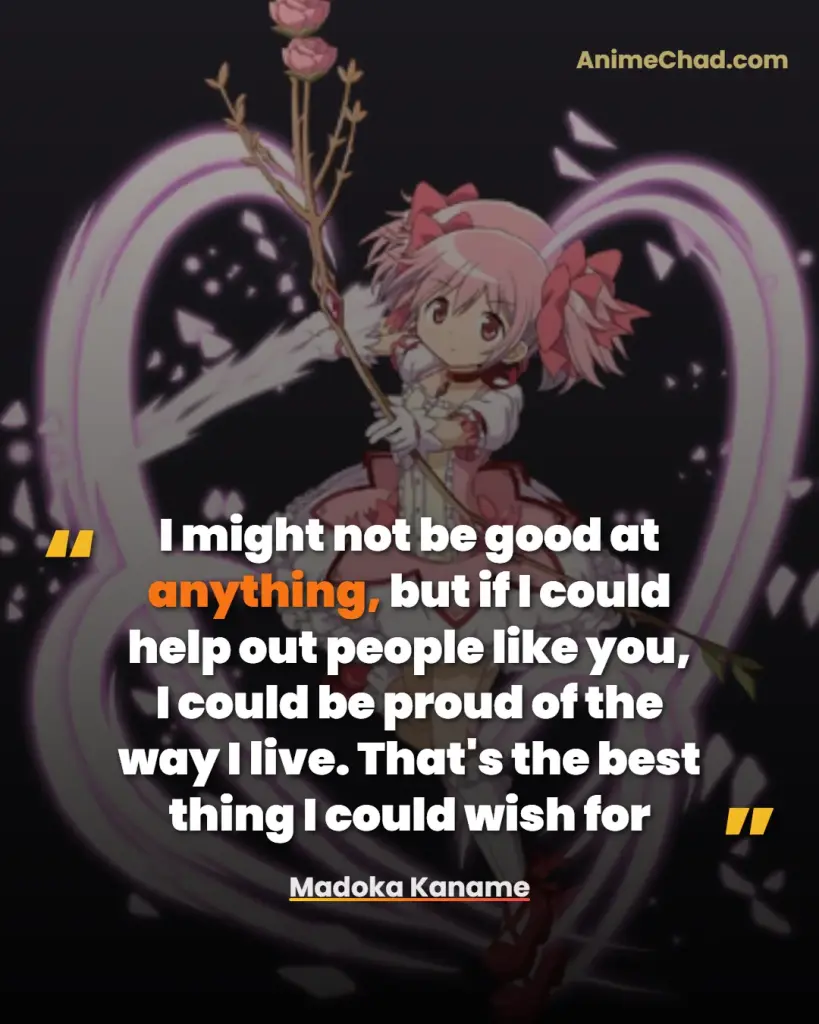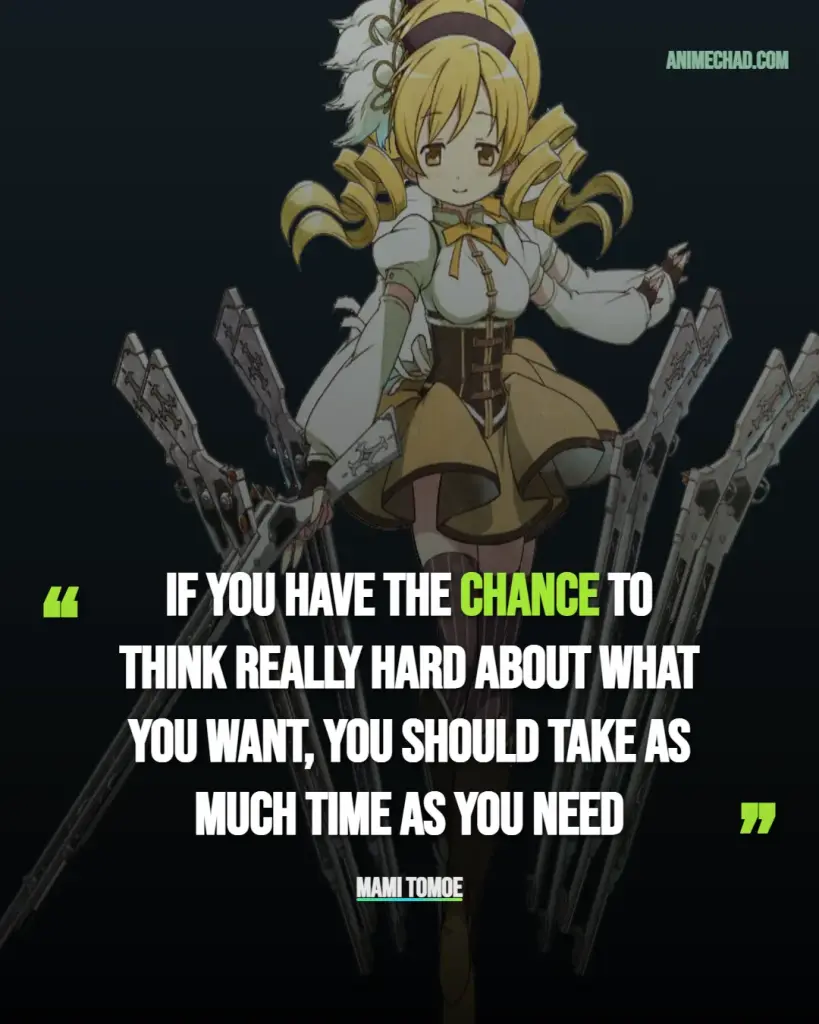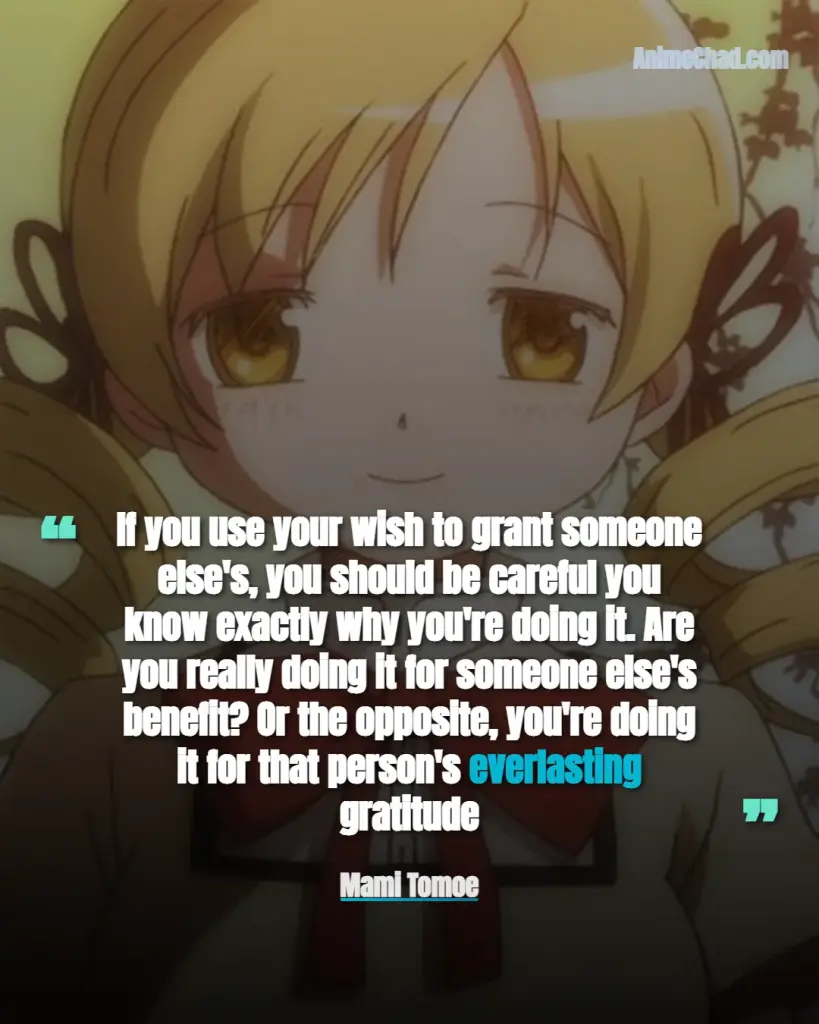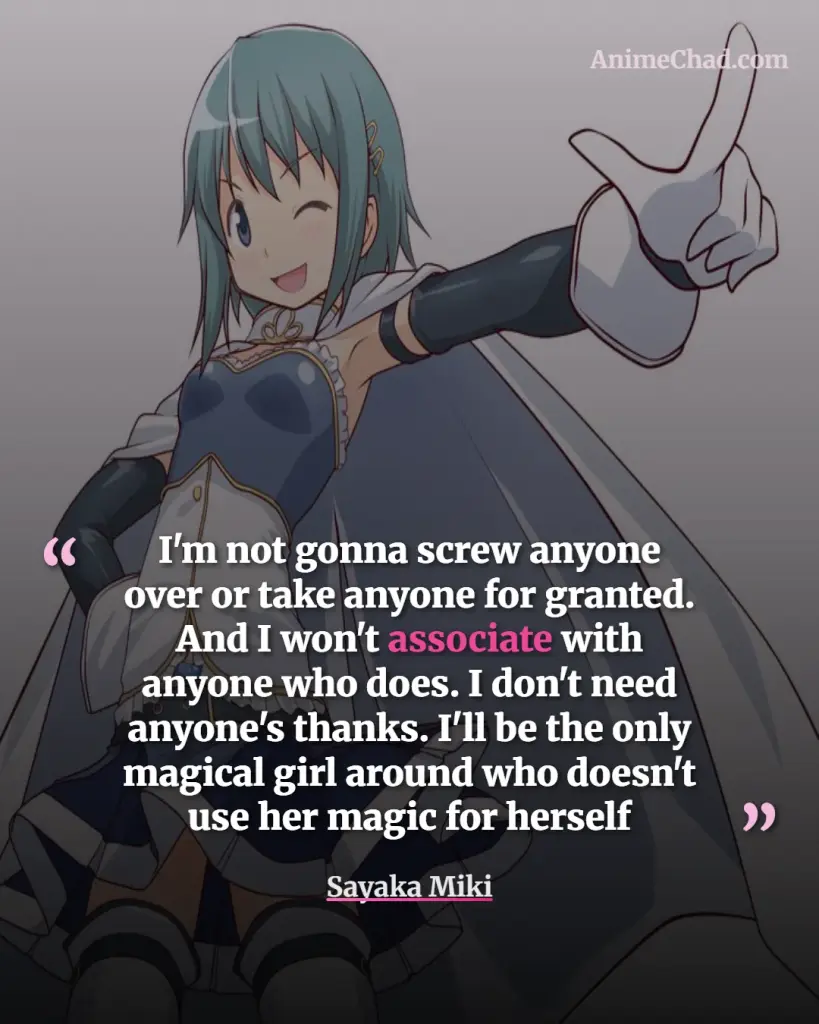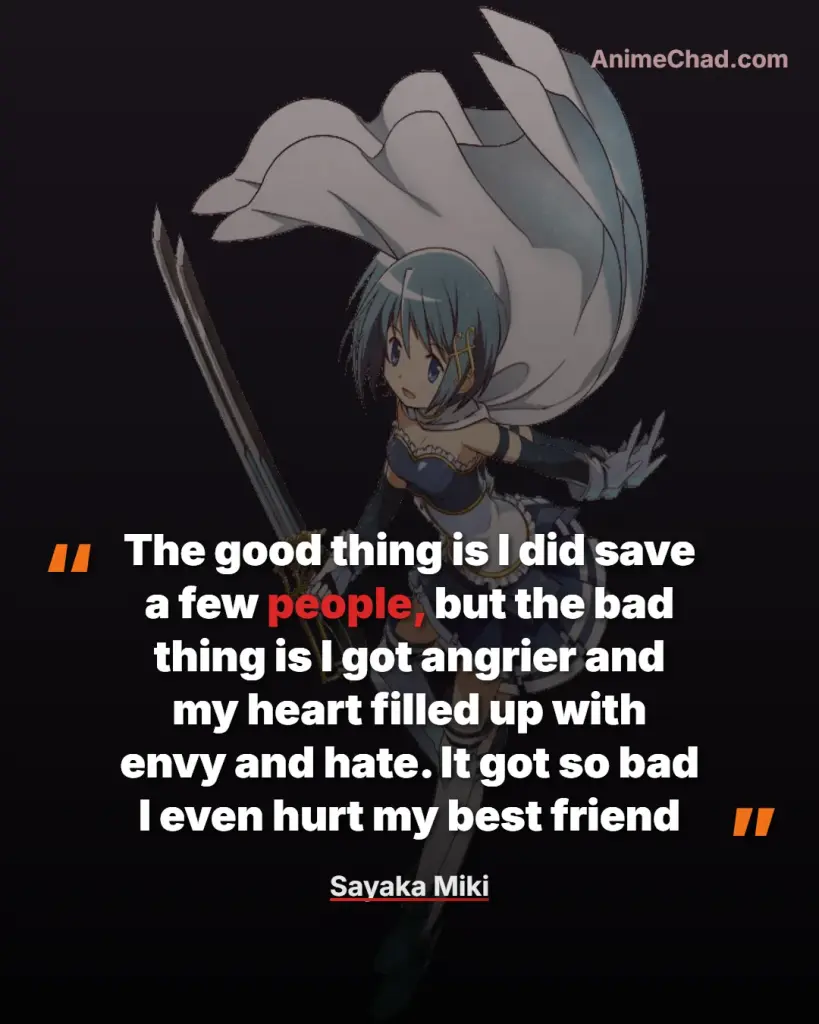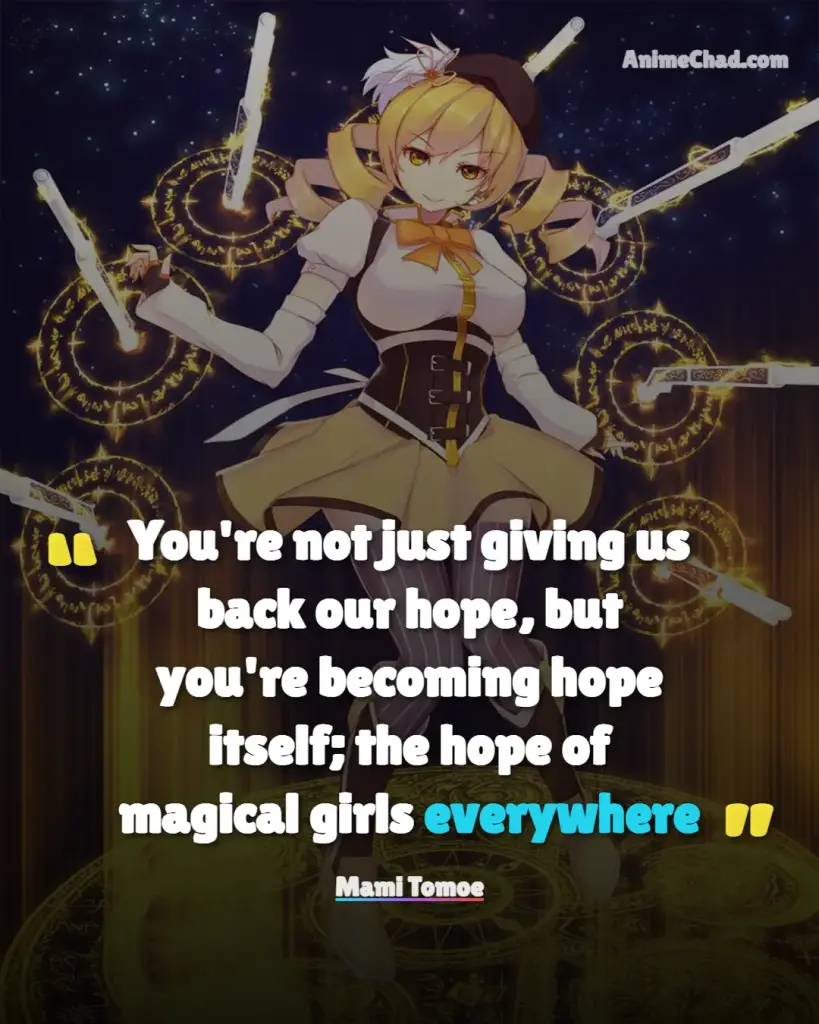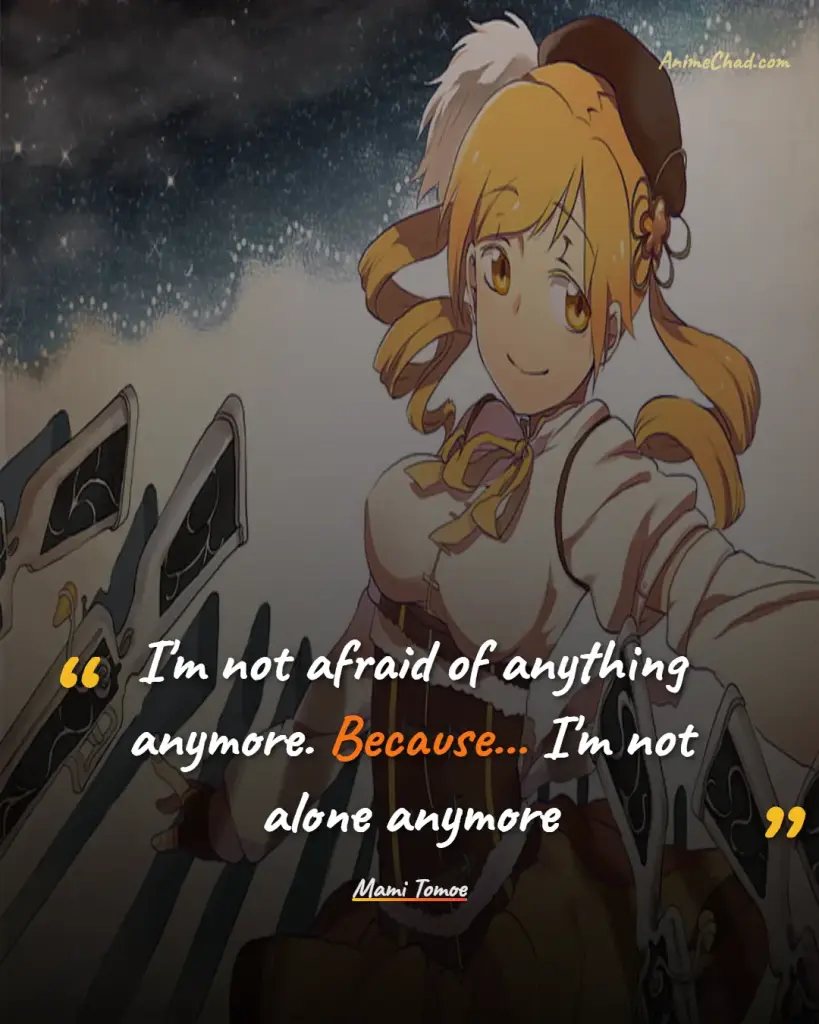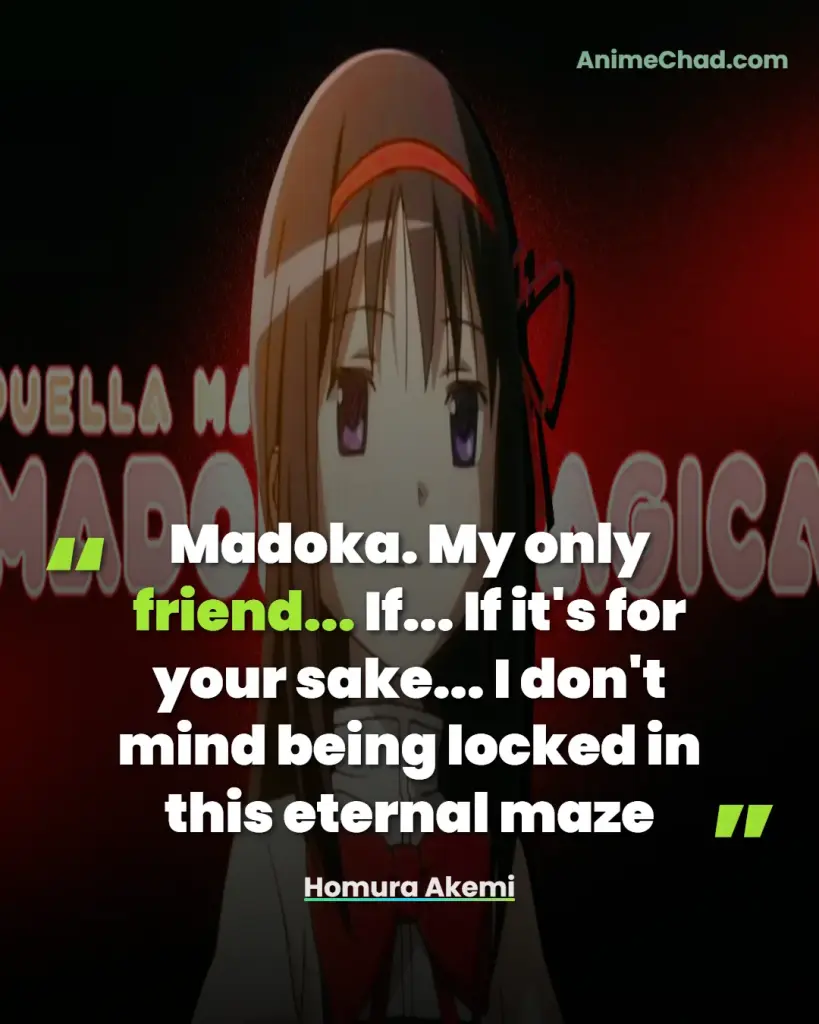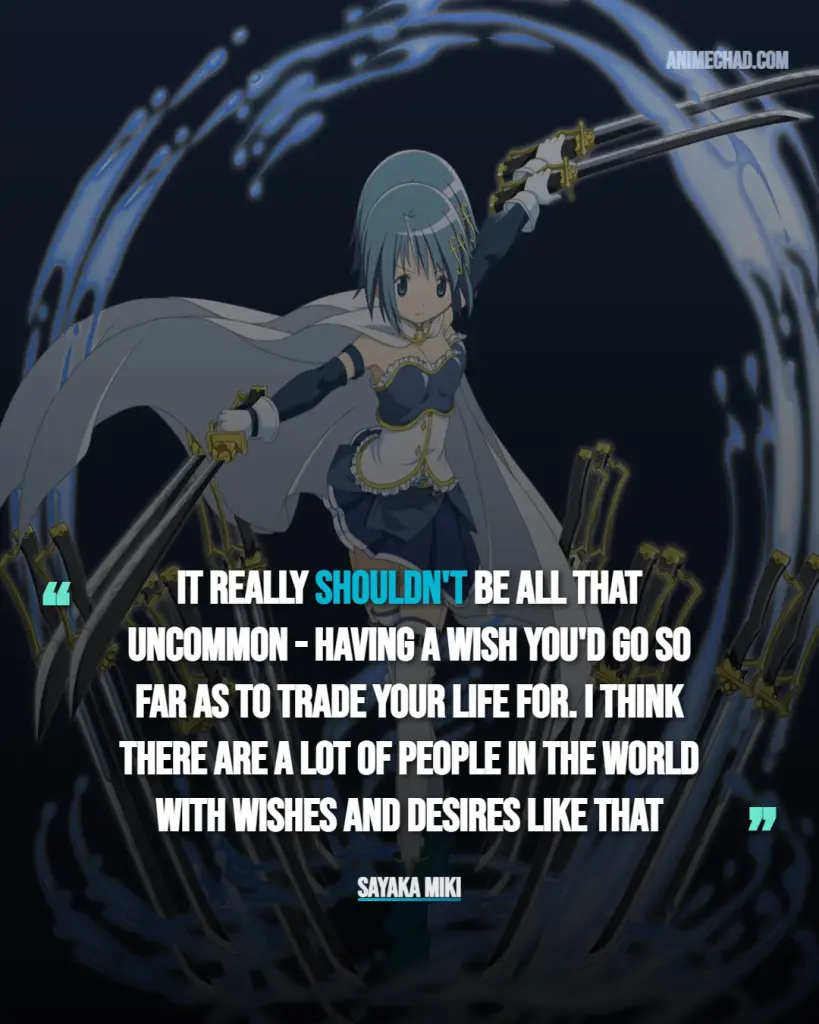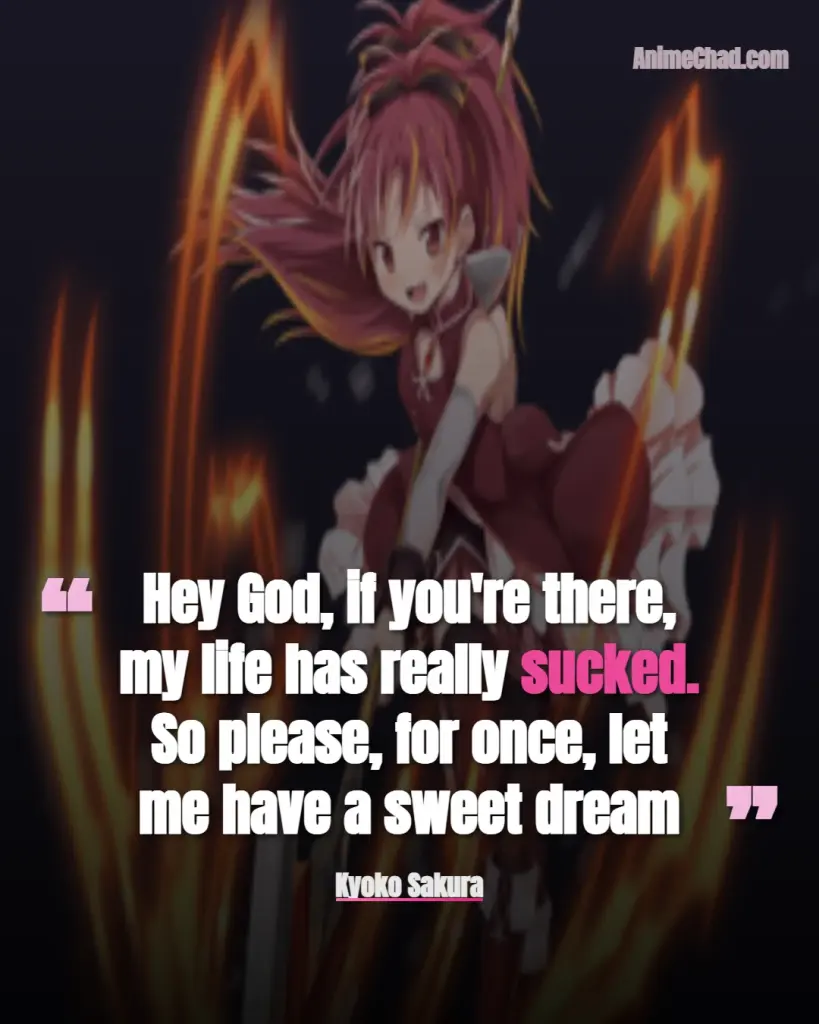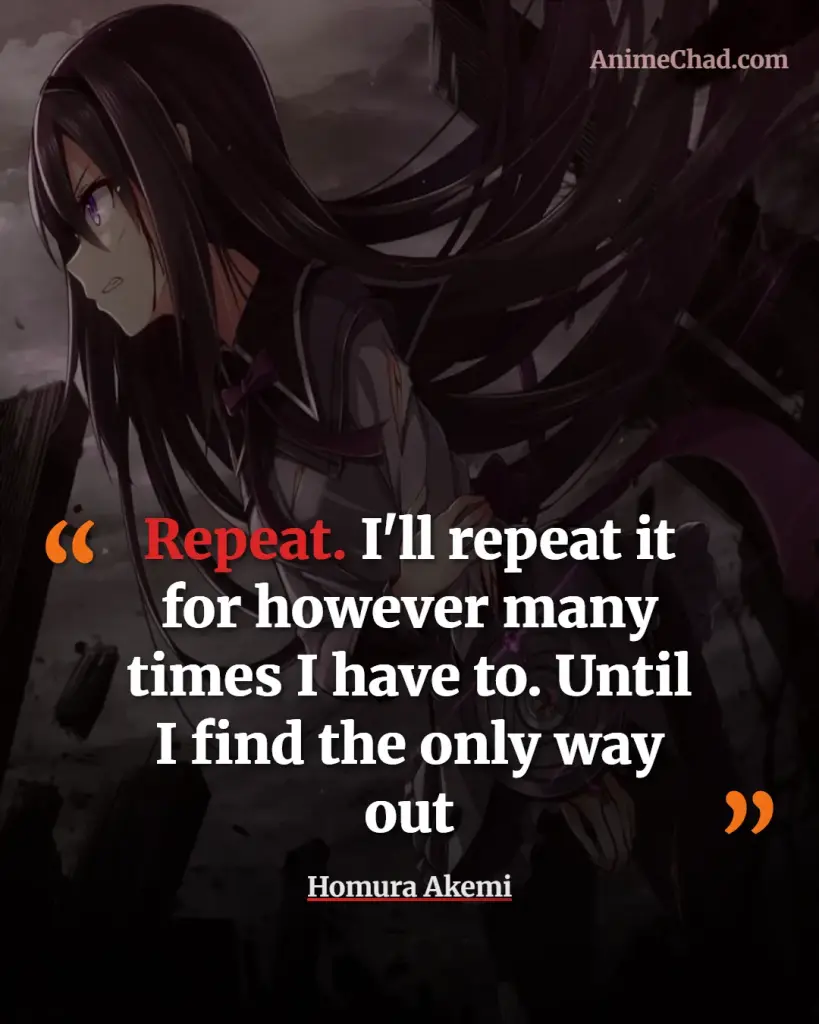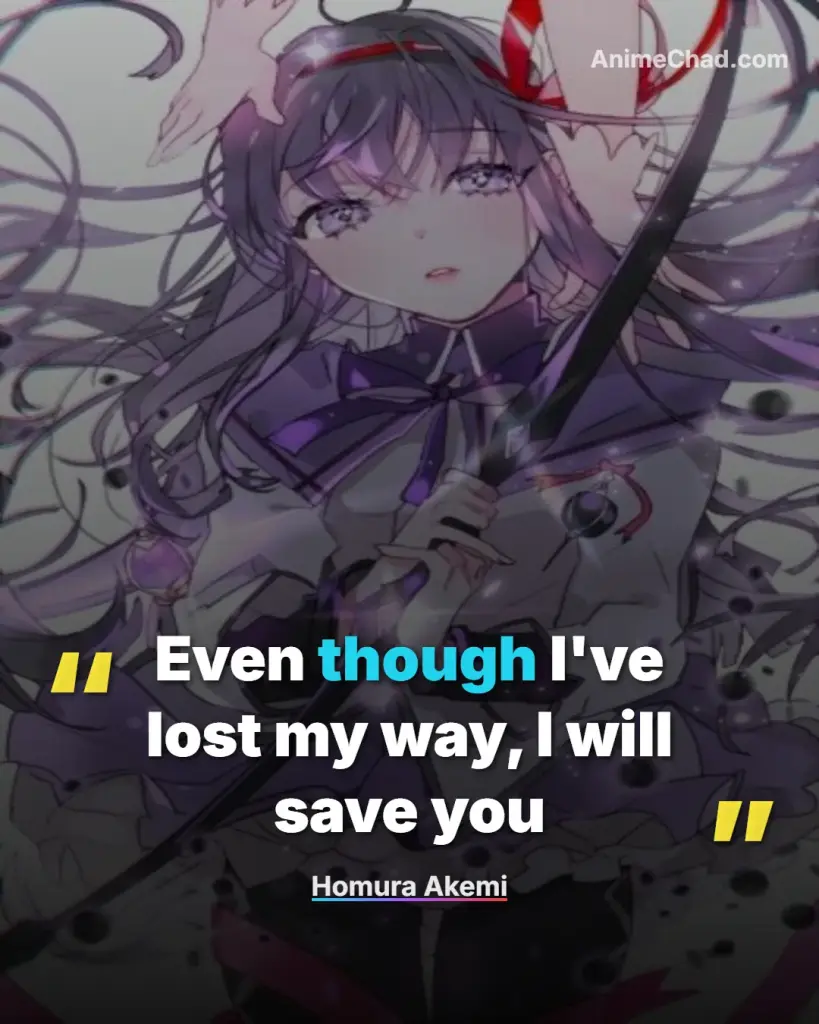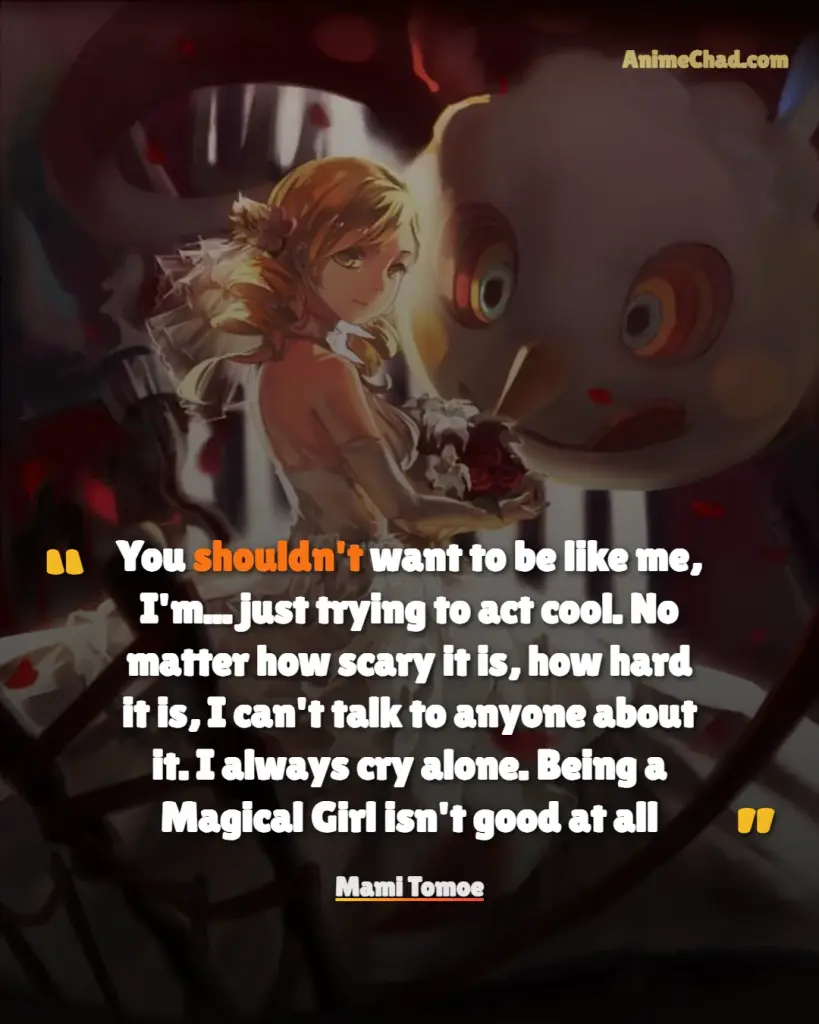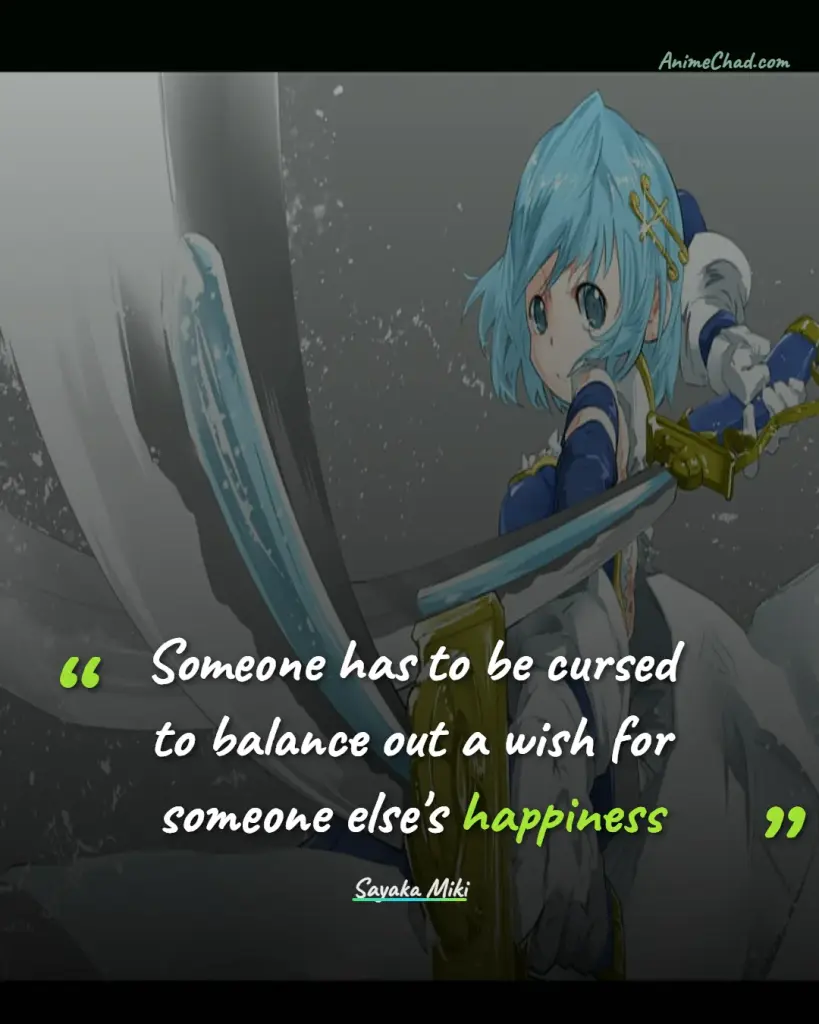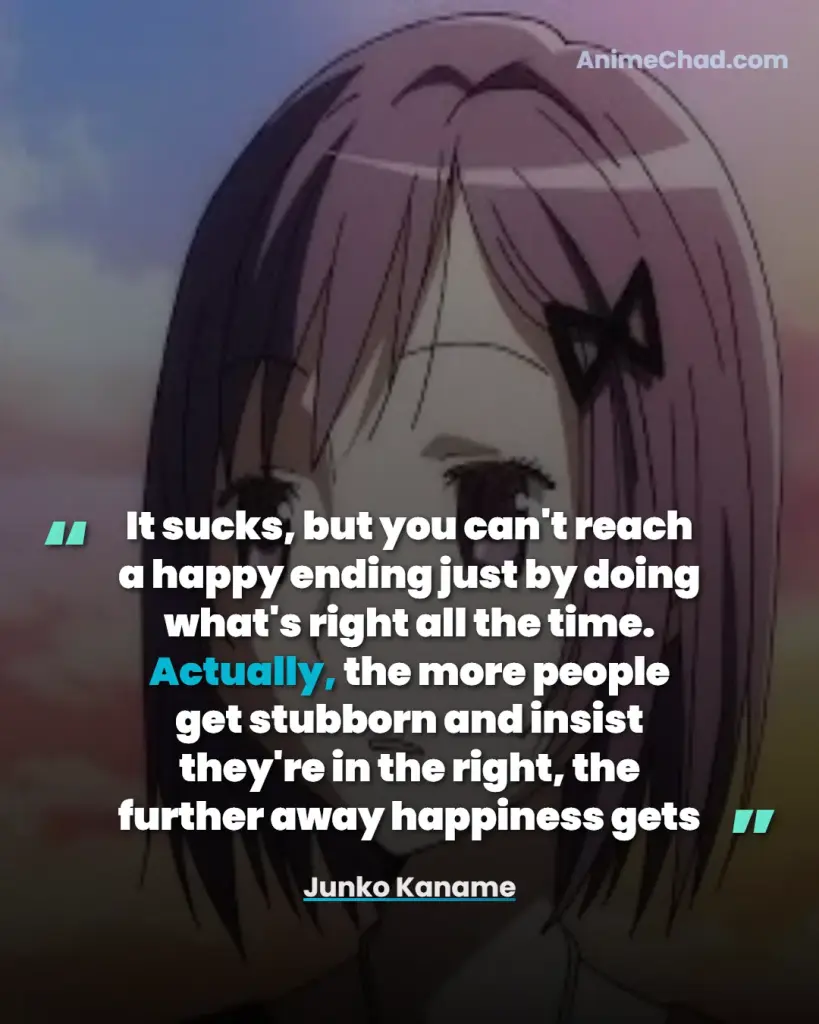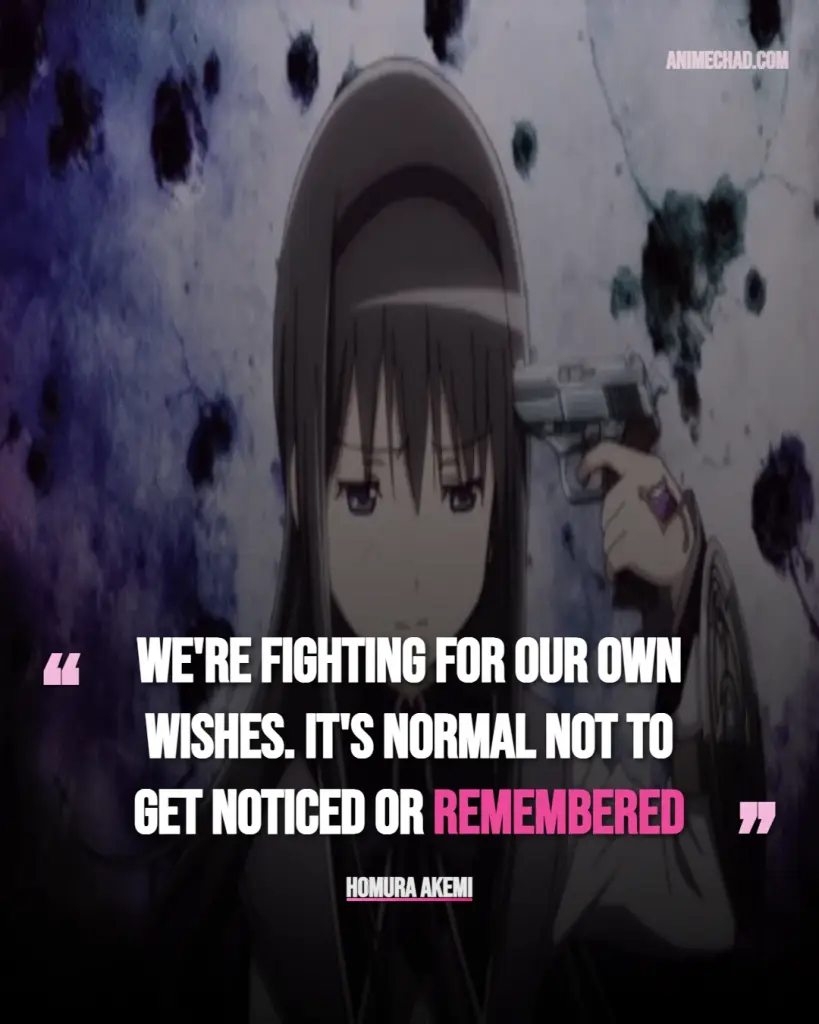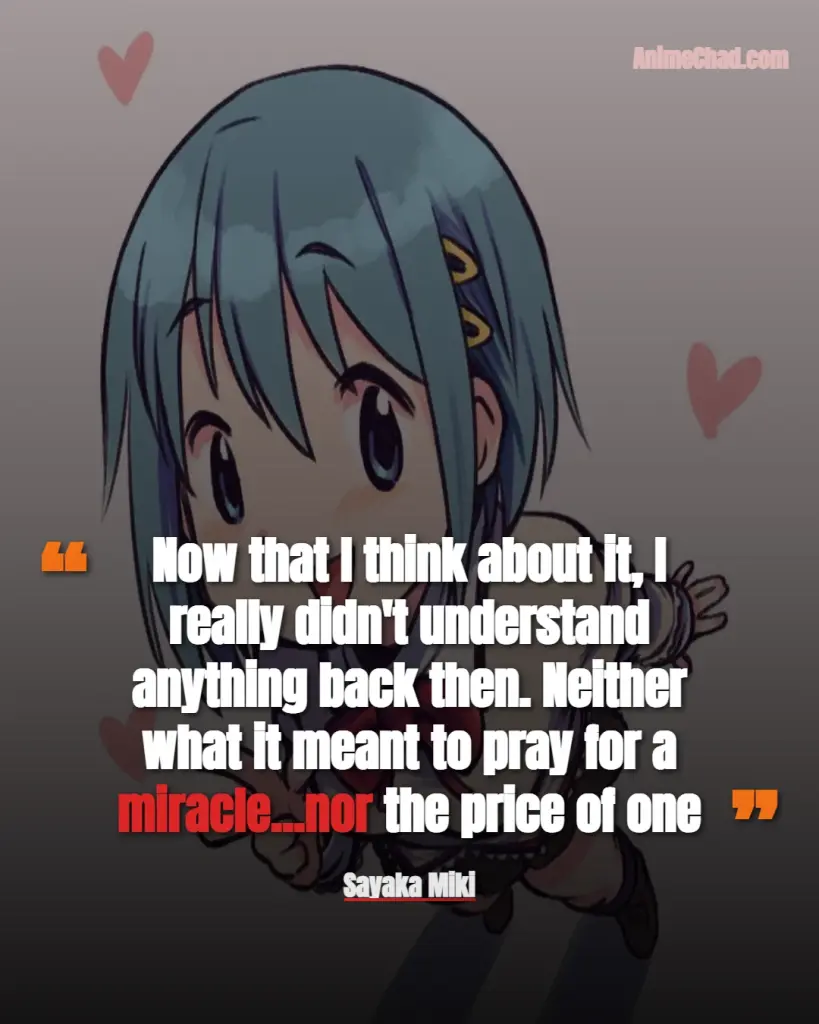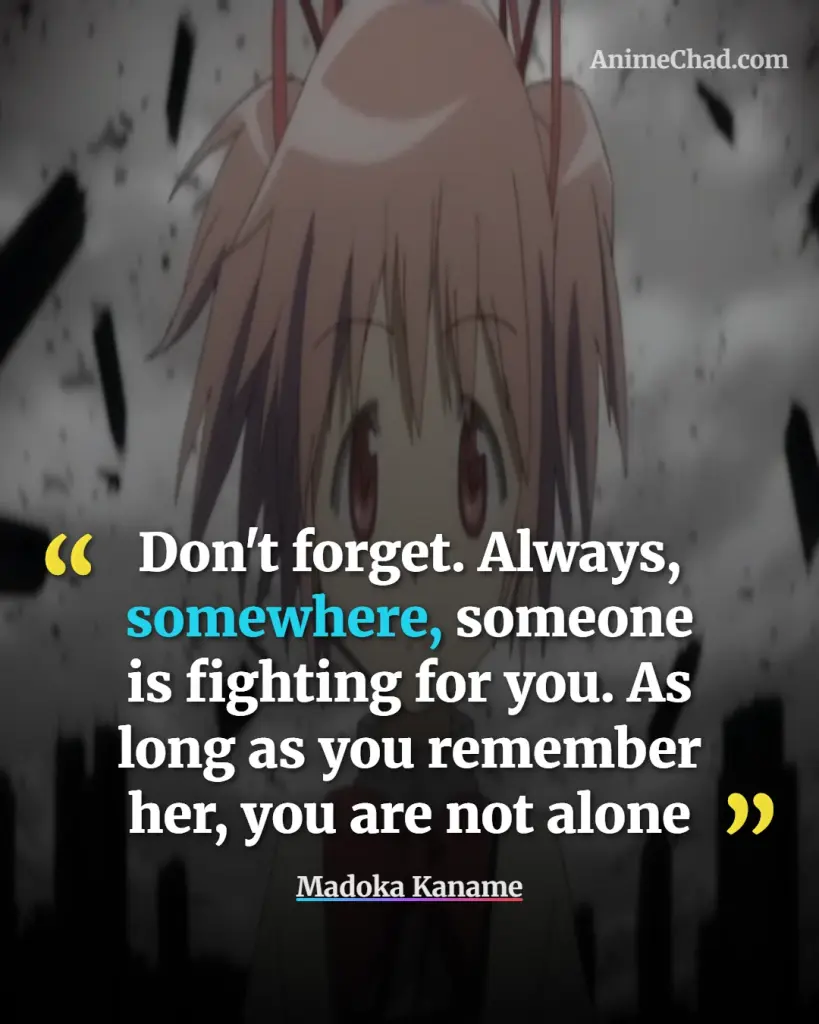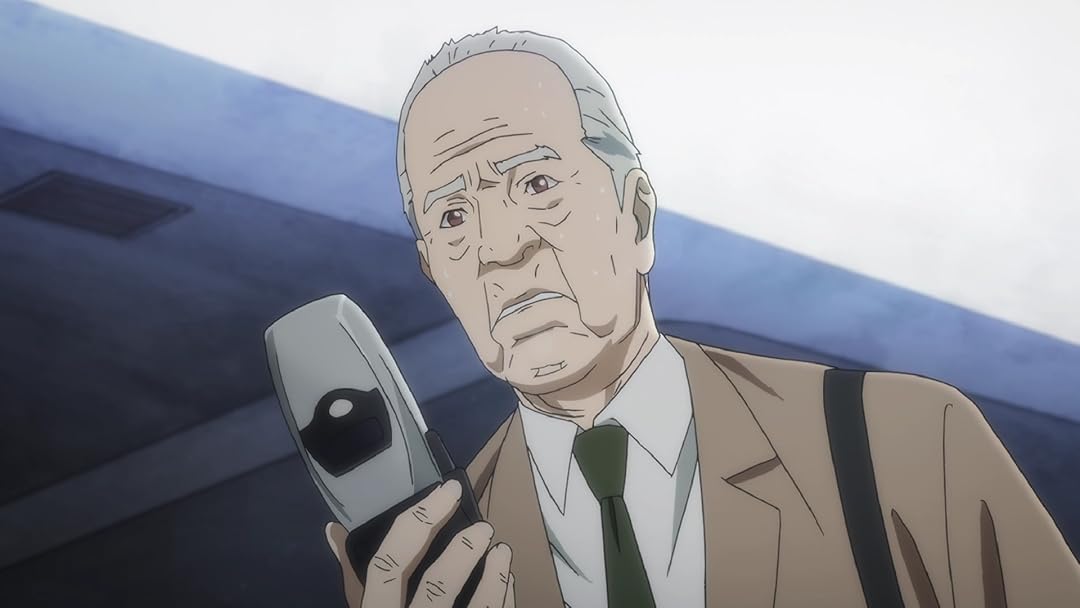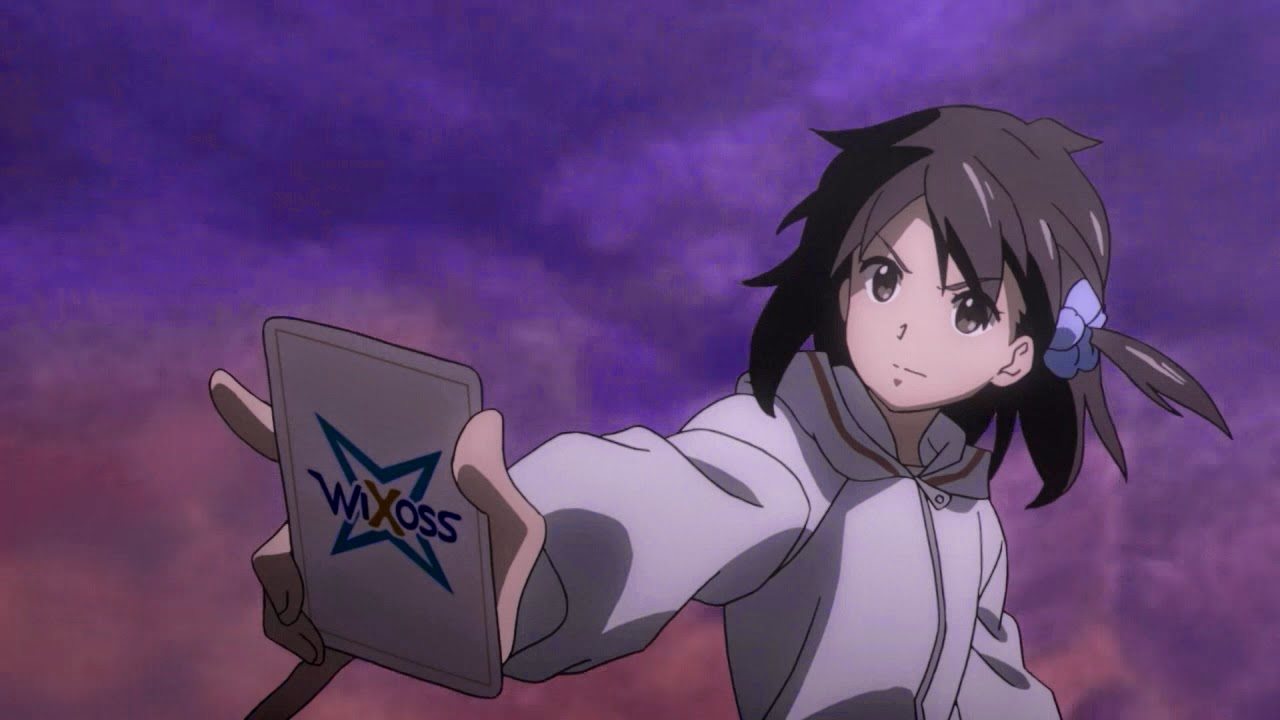Puella Magi Madoka Magica follows Madoka Kaname, a kind-hearted middle school girl drawn into the dark world of magical girls who battle witches born from despair. The series delves into profound themes of hope versus despair, the cost of wishes, and the fragility of friendship and sacrifice.
This curated collection highlights 25 iconic quotes that capture the emotional depth, character growth, and thematic essence across the story’s arcs.
If someone says it’s wrong to hope, I will tell them that they’re wrong every time
Episode 12 (My Very Best Friend)
Madoka Kaname
Madoka’s defiant vow embodies her transformation into a beacon of hope, rejecting despair’s cycle with unyielding optimism.
Protect the one thing you want to protect until the very end
Episode 8 (I Was Stupid, So Stupid)
Kyoko Sakura
Kyoko’s advice to Sayaka underscores her own hardened resolve, highlighting self-sacrifice as a core theme of protection amid loss.
Even if you can’t see me, even if you can’t hear me, I’ll be by your side
Episode 12 (My Very Best Friend)
Madoka Kaname
In her ascension, Madoka promises eternal companionship, evoking profound emotional solace for Homura and all magical girls.
There’re awful, horrible things in this world, I know that now. But there’re a lot of things worth protecting too
Episode 11 (The Only Thing You Have)
Madoka Kaname
Madoka’s realization marks her growth from naivety to maturity, balancing despair with the theme of enduring hope.
Remember this… and take it to heart: kindness sometimes leads to even greater tragedy
Episode 4 (Miracles and Magic Are Real)
Homura Akemi
Homura warns Madoka of naivety’s dangers, revealing her time-loop trauma and the series’ exploration of compassion’s double edge.
If you think you can do it, do it. I mean, you found your reason to fight, yeah? And you ain’t running away anymore, right? So, there’s nothing holding you back
Episode 9 (I’d Never Allow That to Happen)
Kyoko Sakura
Encouraging Sayaka in battle, Kyoko shows her redemption arc, emphasizing determination against inevitable despair.
If someone like me could do that, go around helping people who are in trouble, then I think that would be… truly wonderful
Episode 2 (That Would Be Truly Wonderful)
Madoka Kaname
Madoka’s innocent aspiration reflects her initial idealism, setting up her journey toward sacrificial heroism.
I might not be good at anything, but if I could help out people like you, I could be proud of the way I live. That’s the best thing I could wish for
Episode 4 (Miracles and Magic Are Real)
Madoka Kaname
Expressing self-doubt in a peaceful moment, Madoka hints at her potential, tying into themes of purpose through altruism.
If you have the chance to think really hard about what you want, you should take as much time as you need
Episode 3 (I’m Not Afraid of Anything Anymore)
Mami Tomoe
Mami’s gentle advice during tea reveals her loneliness, underscoring the weight of hasty wishes in the magical girl system.
If you use your wish to grant someone else’s, you should be careful you know exactly why you’re doing it. Are you really doing it for someone else’s benefit? Or the opposite, you’re doing it for that person’s everlasting gratitude
Episode 4 (Miracles and Magic Are Real)
Mami Tomoe
Mami cautions Sayaka on selflessness, exposing her own regrets and the theme of unintended consequences from wishes.
I’m not gonna screw anyone over or take anyone for granted. And I won’t associate with anyone who does. I don’t need anyone’s thanks. I’ll be the only magical girl around who doesn’t use her magic for herself
Episode 7 (Can You Face Yourself?)
Sayaka Miki
Sayaka declares her heroic ideals, marking her descent into despair as altruism clashes with reality’s cruelty.
The good thing is I did save a few people, but the bad thing is I got angrier and my heart filled up with envy and hate. It got so bad I even hurt my best friend
Episode 8 (I Was Stupid, So Stupid)
Sayaka Miki
In her witch transformation, Sayaka laments her fall, highlighting emotional corruption from unbalanced hope and despair.
You’re not just giving us back our hope, but you’re becoming hope itself; the hope of magical girls everywhere
Episode 12 (My Very Best Friend)
Mami Tomoe
Mami’s awe at Madoka’s sacrifice captures redemption and the ultimate theme of hope transcending individual tragedy.
I’m not afraid of anything anymore. Because… I’m not alone anymore
Episode 3 (I’m Not Afraid of Anything Anymore)
Mami Tomoe
After bonding with Madoka and Sayaka, Mami finds fleeting strength in friendship, contrasting her underlying isolation.
Madoka. My only friend… If… If it’s for your sake… I don’t mind being locked in this eternal maze
Episode 10 (I Won’t Rely on Anyone Anymore)
Homura Akemi
Homura’s tearful confession reveals her obsessive devotion, deepening the pain of endless cycles for love.
It really shouldn’t be all that uncommon – having a wish you’d go so far as to trade your life for. I think there are a lot of people in the world with wishes and desires like that
Episode 5 (There’s No Way I’ll Ever Regret It)
Sayaka Miki
Post-contract regret in a reflective moment, Sayaka questions fairness, foreshadowing her arc’s tragic idealism.
Hey God, if you’re there, my life has really sucked. So please, for once, let me have a sweet dream
Episode 7 (Can You Face Yourself?)
Kyoko Sakura
In a vulnerable prayer, Kyoko exposes her tragic past, connecting to themes of lost innocence and fleeting peace.
Repeat. I’ll repeat it for however many times I have to. Until I find the only way out
Episode 10 (I Won’t Rely on Anyone Anymore)
Homura Akemi
Homura vows persistence against Walpurgisnacht, showcasing her growth into solitary resolve amid futile battles.
Even though I’ve lost my way, I will save you
Episode 10 (I Won’t Rely on Anyone Anymore)
Homura Akemi
In battle despair, Homura reaffirms her purpose for Madoka, emphasizing love’s endurance through isolation.
You shouldn’t want to be like me, I’m… just trying to act cool. No matter how scary it is, how hard it is, I can’t talk to anyone about it. I always cry alone. Being a Magical Girl isn’t good at all
Episode 3 (I’m Not Afraid of Anything Anymore)
Mami Tomoe
Mami’s breakdown after defeat shatters her facade, revealing the emotional toll of solitary heroism.
Someone has to be cursed to balance out a wish for someone else’s happiness
Episode 8 (I Was Stupid, So Stupid)
Sayaka Miki
Sayaka grasps the system’s cruelty during her collapse, illuminating the theme of equivalent exchange’s despair.
It sucks, but you can’t reach a happy ending just by doing what’s right all the time. Actually, the more people get stubborn and insist they’re in the right, the further away happiness gets
Episode 5 (There’s No Way I’ll Ever Regret It)
Junko Kaname
Madoka’s mother offers worldly wisdom in a family talk, contrasting adult pragmatism with youthful ideals.
We’re fighting for our own wishes. It’s normal not to get noticed or remembered
Episode 1 (As If I Met Her in My Dream…)
Homura Akemi
Homura’s enigmatic warning hints at her burden, introducing themes of unseen sacrifices from the start.
Now that I think about it, I really didn’t understand anything back then. Neither what it meant to pray for a miracle…nor the price of one
Episode 8 (I Was Stupid, So Stupid)
Sayaka Miki
As a witch emerges, Sayaka reflects on ignorance, encapsulating the series’ revelation of wishes’ hidden costs.
Don’t forget. Always, somewhere, someone is fighting for you. As long as you remember her, you are not alone
Episode 12 (My Very Best Friend)
Madoka Kaname
Madoka’s final narration provides uplifting closure, transforming personal loss into collective hope.

